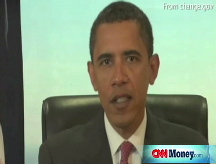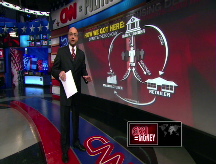Tax cuts: Pillows for a hard landing
The Obama administration is expected to propose $300B in tax cuts in a stimulus plan. But economists are divided about how much of an impact they will have.
NEW YORK (CNNMoney.com) -- So it looks like about 40% of President-elect Barack Obama's stimulus plan will come in the form of tax cuts.
This shouldn't come as a major surprise. Hiking taxes in the face of the worst recession in decades could have catastrophic effects on the economy.
With that in mind, Obama has to realize that there is urgency to get some sort of stimulus package passed, even if it's not the perfect proposal.
"I don't think this would be the Obama administration's preferred program," said David Wyss, chief economist with Standard & Poor's. "But getting it through Congress is important and speed probably trumps getting exactly what they want."
Still, will the likely $300 billion in proposed tax cuts (to put that in perspective, it's more than double last year's Bush tax rebate) actually help?
Of course, tax cuts could be good for the economy. In theory, lower taxes should act as an incentive to consumers and businesses.
If consumers spend more, then corporations would need to produce more, and hence, hire more people to meet such demand.
And businesses, faced with a less onerous tax burden, would have even more reasons to invest in new factories, equipment and projects, which should also lead to more jobs.
But some experts suggest that these tax cuts may not have this effect. That's because - as hard as it may be to believe - consumers may have actually learned their lessons from the credit collapse and may be more fiscally responsible.
"There will be significant pressure on people to increase their savings. So the propensity to spend is going to be less than expected," said Keith Hembre, chief economist with First American Funds in Minneapolis. "So will this stimulus package magically produce sustained strong growth? That's very doubtful."
At best, tax cuts may provide a temporary bump to the economy. And you only need to look to last summer for evidence of how tax cuts served as just a quick fix.
Fueled by about $130 billion in tax rebates, consumers spent in the second quarter of last year, helping to boost the nation's gross domestic product by 2.8%.
This, as we all know, was short-lived. The economy shrunk by 0.5% in the third quarter, and most economists believe it declined at a much steeper rate in the fourth quarter.
Wyss said there is reason to believe that another tax cut would also do little to get the economy out of recession.
For one, he said that even if consumers use the money to buy stuff, this may not help lead to many new jobs if the money is spent on, say, flat-screen TVs manufactured in Asia or clothing made in Europe.
Still, it's important to note that the lower taxes for consumers will probably not come in the form of a refund check. According to reports, the Obama administration will propose about $150 billion in tax credits for workers.
"They're not taking about rebates. They are looking at making the tax cuts semi-permanent. That would have more impact," said Diane Swonk, chief economist with Mesirow Financial, a diversified financial services firm based in Chicago.
Swonk added that the key to a successful stimulus package is not just increased infrastructure spending to create new jobs in the future, but providing relief to people that still have jobs but are feeling a pinch.
"The clock is ticking on the economy today. Spending to stimulate job creation is a good idea but the government needs to bridge that gap with more cash for people that are already working," she said.
Still, Wyss cautioned that tax cuts cannot be viewed as a cure for the economy's myriad woes. In particular, he argued that tax cuts for businesses won't solve the underlying problem facing many corporations right now: the lack of availability of credit.
"There is not much evidence that tax cuts for businesses do anything. You can accelerate deprecation, but if businesses can't borrow money to make capital investments it doesn't do any good," he said.
But Kurt Karl, chief U.S. economist with Swiss Re, said the corporate tax cuts could wind up saving some companies from going out of business. He predicts that if the tax cuts are approved, there will be a lower number of corporate bankruptcies than there otherwise would have been.
And even though that may not mean more new jobs any time soon, it could help stem job losses.
"We're faced with a large number of marginal businesses that will go under. This may allow some of the ones barely hanging on to keep people employed," he said.
Swonk agreed that corporate tax cuts probably won't do much to get businesses hiring and the economy growing again anytime soon. But she maintained that a stimulus package is needed to keep the economy from further spiraling out of control.
"No matter what the government does, there is no silver bullet for 2009. This is all about setting the stage for 2010 and mitigating the upward rise of unemployment," Swonk said. "They are throwing pillows down for the hard landing. That's what this is designed to do." ![]()




